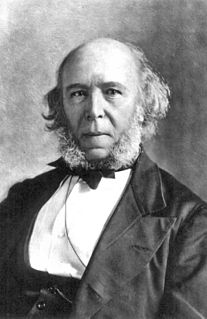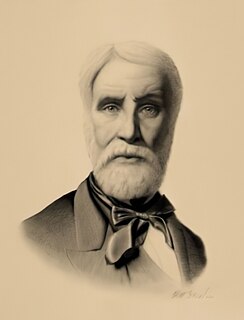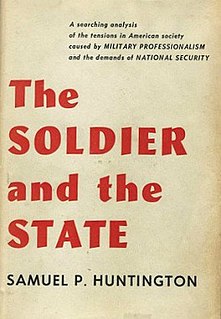Anarcho-capitalism is a political philosophy and economic theory that advocates the elimination of centralized states in favor of a system of private property enforced by private agencies, free markets and the right-libertarian interpretation of self-ownership, which extends the concept to include control of private property as part of the self. In the absence of statute, anarcho-capitalists hold that society tends to contractually self-regulate and civilize through participation in the free market which they describe as a voluntary society. In a theoretical anarcho-capitalist society, the system of private property would still exist and be enforced by private defense agencies and insurance companies selected by customers which would operate competitively in a market and fulfill the roles of courts and the police.

The Liberal Party was one of the two major political parties in the United Kingdom with the opposing Conservative Party in the 19th and early 20th centuries. The party arose from an alliance of Whigs and free trade–supporting Peelites and the reformist Radicals in the 1850s. By the end of the 19th century, it had formed four governments under William Gladstone. Despite being divided over the issue of Irish Home Rule, the party returned to government in 1905 and then won a landslide victory in the following year's general election.
Classical liberalism is a political ideology and a branch of liberalism that advocates free market, civil liberties under the rule of law with an emphasis on limited government, economic freedom, and political freedom. It was developed in the early 19th century, building on ideas from the previous century as a response to urbanization and to the Industrial Revolution in Europe and North America.
The Whigs were a political faction and then a political party in the parliaments of England, Scotland, Great Britain, Ireland and the United Kingdom. Between the 1680s and the 1850s, the Whigs contested power with their rivals, the Tories. The Whigs merged into the new Liberal Party in the 1850s, though some Whig aristocrats left the Liberal Party in 1886 to form the Liberal Unionist Party, which merged into the Liberals' rival, the modern day Conservative Party, in 1912.

Herbert Spencer was an English philosopher, biologist, anthropologist, and sociologist famous for his hypothesis of social Darwinism whereby superior physical force shapes history. Spencer originated the expression "survival of the fittest", which he coined in Principles of Biology (1864) after reading Charles Darwin's On the Origin of Species. The term strongly suggests natural selection, yet Spencer saw evolution as extending into realms of sociology and ethics, so he also supported Lamarckism.

Auberon Edward William Molyneux Herbert was a British writer, theorist, philosopher, and 19th century individualist. He was a son of the 3rd Earl of Carnarvon. He was Liberal Member of Parliament for the two-member constituency of Nottingham from 1870 to 1874.

William Graham Sumner was a classical liberal American social scientist. He taught social sciences at Yale, where he held the nation's first professorship in sociology. He was one of the most influential teachers at Yale or any other major school. Sumner wrote widely within the social sciences, with numerous books and essays on American history, economic history, political theory, sociology, and anthropology. He supported laissez-faire economics, free markets, and the gold standard. He adopted the term "ethnocentrism" to identify the roots of imperialism, which he strongly opposed, and as a spokesman against it he was in favor of the "forgotten man" of the middle class, a term he coined. He had a long-term influence on conservatism in the United States.
Self-ownership, also known as sovereignty of the individual or individual sovereignty, is the concept of property in one's own person, expressed as the moral or natural right of a person to have bodily integrity and be the exclusive controller of one's own body and life. Self-ownership is a central idea in several political philosophies that emphasize individualism, such as libertarianism, liberalism, and anarchism.

Embedded liberalism is a term for the global economic system and the associated international political orientation as they existed from the end of World War II to the 1970s. The system was set up to support a combination of free trade with the freedom for states to enhance their provision of welfare and to regulate their economies to reduce unemployment. The term was first used by the American political scientist John Ruggie in 1982.
Slouching Towards Gomorrah: Modern Liberalism and American Decline is a 1996 non-fiction book by Robert H. Bork, a former United States Court of Appeals judge. Bork's thesis in the book is that U.S. and more generally Western culture is in a state of decline and that the cause of this decline is modern liberalism and the rise of the New Left. Specifically, he attacks modern liberalism for what he describes as its dual emphases on radical egalitarianism and radical individualism. The title of the book is a play on the last couplet of W. B. Yeats's poem "The Second Coming": "And what rough beast, its hour come round at last, / Slouches towards Bethlehem to be born?" Bork contends that the "rough beast of decadence … now sends us slouching towards our new home, not Bethlehem but Gomorrah." More directly, the title borrows from Joan Didion's Slouching Towards Bethlehem.
Fiscal conservatism is a political and economic philosophy regarding fiscal policy and fiscal responsibility with an ideological basis in capitalism, individualism, limited government, and laissez-faire economics. Fiscal conservatives advocate tax cuts, reduced government spending, free markets, deregulation, privatization, free trade, and minimal government debt. Fiscal conservatism follows the same philosophical outlook of classical liberalism. This concept is derived from economic liberalism and can also be referred to as fiscal liberalism outside the United States.

Ludwig Heinrich Edler von Mises was an Austrian School economist, historian, logician, and sociologist. Mises wrote and lectured extensively on the societal contributions of classical liberalism and is known for explaining how communism always ends in totalitarianism and dictatorships. He is best known for his work on praxeology studies comparing communism and capitalism. He is considered one of the most influential economic and political thinkers of the 20th century.
Right-libertarianism, also known as libertarian capitalism or right-wing libertarianism, is a political philosophy and type of libertarianism that supports capitalist property rights and defends market distribution of natural resources and private property. The term right-libertarianism is used to distinguish this class of views on the nature of property and capital from left-libertarianism, a type of libertarianism that combines self-ownership with an egalitarian approach to natural resources. In contrast to socialist libertarianism, right-libertarianism supports free-market capitalism. Like most forms of libertarianism, it supports civil liberties, especially natural law, negative rights, and a major reversal of the modern welfare state.
The law of equal liberty is the fundamental precept of liberalism and socialism. Stated in various ways by many thinkers, it can be summarized as the view that all persons must be granted the maximum possible freedom as long as that freedom does not interfere with the freedom of anyone else. While socialists have been hostile to liberalism, which is accused of "providing an ideological cover for the depredation of capitalism", scholars have stated that "the goals of liberalism are not so different from those of the socialists", although this similarity in goals has been described as being deceptive due to the different meanings liberalism and socialism give to liberty, equality and solidarity, including the meaning, implications and norms of equal liberty derived from it.

The Soldier and the State: The Theory and Politics of Civil-Military Relations is a 1957 book written by political scientist Samuel P. Huntington. In the book, Huntington advances the theory of objective civilian control, according to which the optimal means of asserting control over the armed forces is to professionalize them. This is in contrast to subjective control, which involves placing legal and institutional restrictions on the military's autonomy. Edward M. Coffman has written that "[a]nyone seriously interested in American military history has to come to terms with Samuel P. Huntington's The Soldier and the State."

Liberal democracy, also referred to as Western democracy, is the combination of a liberal political ideology that operates under an indirect democratic form of government. It is characterised by elections between multiple distinct political parties, a separation of powers into different branches of government, the rule of law in everyday life as part of an open society, a market economy with private property, and the equal protection of human rights, civil rights, civil liberties and political freedoms for all people. To define the system in practice, liberal democracies often draw upon a constitution, either codified or uncodified, to delineate the powers of government and enshrine the social contract. After a period of expansion in the second half of the 20th century, liberal democracy became a prevalent political system in the world.
Liberalism is a political and moral philosophy based on liberty, consent of the governed and equality before the law. Liberals espouse a wide array of views depending on their understanding of these principles, but they generally support individual rights, democracy, secularism, freedom of speech, freedom of the press, freedom of religion and a market economy. Yellow is the political colour most commonly associated with liberalism.
Exploitation of labour is a concept defined as, in its broadest sense, one agent taking unfair advantage of another agent. It denotes an unjust social relationship based on an asymmetry of power between workers and their employers. When speaking about exploitation, there is a direct affiliation with consumption in social theory and traditionally this would label exploitation as unfairly taking advantage of another person because of their inferior position, giving the exploiter the power.
Our Enemy, the State is the best-known book by libertarian author Albert Jay Nock, serving as a fundamental influence for the modern libertarian and American conservatism movements. Initially presented as a series of lectures at Bard College, it was published in 1935, and attempts to analyze the origins of American freedom, as well as questioning the nature and legitimacy of authoritarian government. Nock differentiates between that, which he refers to as "the State" and "legitimate" government, including governing oneself or consensual delegation of decision-making to leaders one selects.








